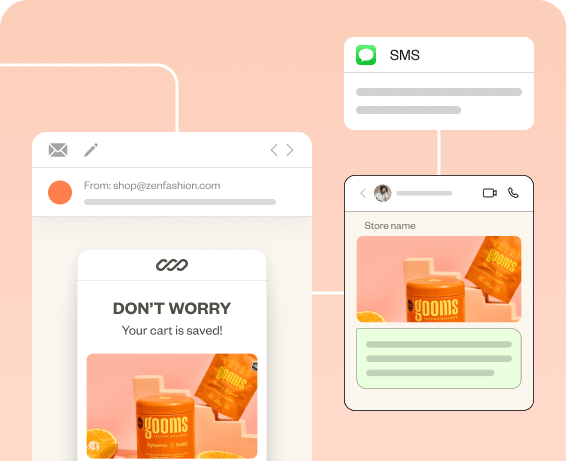TLDR
- WhatsApp marketing for e-commerce drives higher engagement with 98% open rates and outperforms email and SMS.
- Use WhatsApp Business API for scaling, automation, and multi-agent support, especially for growing DTC and Shopify stores.
- Automated WhatsApp flows can increase conversions and reduce the support load of DTC stores.
- WhatsApp personalization and segmentation based on behavior can improve campaign performance by 10–15%.
- Click-to-WhatsApp ads and opt-in strategies like popups, QR codes, and lead magnets help grow your subscriber list fast.
- Follow WhatsApp marketing rules (GDPR, Meta approval, opt-outs) to avoid bans and build long-term customer trust.
Are your customers sending your emails to spam, scrolling past your ads, and not opening your SMS? Then reach them through a way they cannot ignore: WhatsApp marketing.
With over 2.5 billion monthly users and a 98% open rate, WhatsApp offers a lot of potential.
So, if you are still relying only on email or SMS, then you’re missing out on a powerful opportunity to connect with your audience.
This blog will serve as your complete roadmap to creating direct relationships with customers through WhatsApp personalized messaging.
Thus, you can learn how to use WhatsApp for marketing across the entire journey of your customers and drive better results.
Integrate your e-commerce store with WhatsApp seamlessly using Retainful to 7X conversions
What is WhatsApp Marketing?
WhatsApp marketing is the simplest way for businesses to engage their customers through Whatsapp to promote their products and service for better retention and customer engagement.
According to aiSense reports, people open their WhatsApp chats at least 23 times a day. Thus, it is the easiest way to reach the audience in this digital age.
Moreover, WhatsApp conversational marketing creates a two-way interaction. This means your customers can reply to your messages and continue the conversation.
Thus, with WhatsApp personalized messaging, you can create an engagement with your customers and also win an immediate response.
As a result, this surpasses traditional email and SMS with instant visibility (including read receipts), enhanced media capabilities (such as product photos, videos, and catalogs), and real-time customer support (via live chat).
WhatsApp Business App vs WhatsApp API: Which One Is Right for You?
You can carry out marketing with WhatsApp in two ways:
- WhatsApp Business App
- WhatsApp Business API
WhatsApp Business App
It is perfect for small stores. Specifically, ones that handle up to 1,000 messages monthly.
It costs nothing to use, however, has limited automation features.
WhatsApp Business API
This is built for high-volume stores. Therefore, it has unlimited messaging capacity.
However, it has pay-per-message pricing. Hence, it is the perfect advanced WhatsApp chatbot for online stores.
API is not only for enterprise brands, but even mid-sized stores can benefit from WhatsApp Business API integration, provided they’re serious about customer engagement.
Setting up WhatsApp Business API for e-commerce requires working with an official Business Solution Provider (BSP) like Twilio, WATI, or Zoko.
Here’s a quick comparison of the differences between WhatsApp Business App and WhatsApp Business API :
| Feature | Business App | Business API |
| Cost | Free | Pay-per-message |
| Message Volume | Limited | Unlimited |
| Multi-agent Support | No | Yes |
| Automation | Basic | Advanced |
| Integration | Manual | Full ecommerce stack |
5 Benefits of WhatsApp Marketing
The 5 benefits of WhatsApp marketing are:
- High Open Rates: Your marketing emails usually have only 20% open rates. However, WhatsApp messages have a 98% open rate. Hence, your offers will be seen.
- Direct Customer Conversations: Unlike social media, WhatsApp for Business can enable real-time, two-way communication. Thus, you can answer questions quickly and close sales faster using personal touch.
- Cost-Effective Marketing: WhatsApp Business API is charged per message. It is low in comparison to expensive PPC campaigns. Moreover, you can get 3 to 5 times more ROI than email marketing.
- Seamless Shopping Experience: By sending product catalogs, collecting payments, and confirming orders in WhatsApp, you can offer an easy shopping experience.
- Automated Customer Support: You can set up WhatsApp chatbots to handle FAQs, shipping inquiries, and basic troubleshooting 24/7. Thus, you can reduce support tickets by up to 40% and keep customers satisfied.
How to Set Up WhatsApp Marketing in 6 Simple Steps?
To set up WhatsApp marketing for your business, follow these 6 steps:
- Creating a Verified WhatsApp Business Profile
- Choosing the Right WhatsApp Marketing Software
- Encourage Customer Signups
- Segment Audience and Personalize Messages
- Set up WhatsApp Marketing Automation
- Track Performance & Optimize
1. Creating a Verified WhatsApp Business Profile
Before setting up your WhatsApp Business Account, decide if you want the WhatsApp Business App (small businesses) or WhatsApp Business API (advanced features for larger operations).
The next step is to get your green tick verification.
To get your WhatsApp business verified, your business must submit:
- Business registration documents
- Proof of address
- Company logo in the required format
Verification may typically take 2-3 weeks on average. Hence, start this process early.
Having a verified WhatsApp profile can build customer trust instantly and thus improve message deliverability rates by up to 30%.
2. Choosing the Right WhatsApp Marketing Software
Selecting the right WhatsApp marketing tools can be a big part of your strategy to succeed.
The top WhatsApp BSP options include:
- Retainful: Perfect for e-commerce with WooCommerce & Shopify integration
- Twilio: Excellent for developers with robust APIs
- WATI: User-friendly interface with ready-made templates
- AiSensy: Budget-friendly with powerful automation features
The important factors to look for in a WhatsApp tool for marketing are:
- Seamless integration with your current systems
- Reliable WhatsApp broadcast software capabilities
- Detailed analytics reporting
- Template management features
Ensure your choice depends on your technical expertise, budget, and specific marketing goals.
3. Encourage Customer Signups
Once you have set up your WhatsApp business account, you will need of list of WhatsApp subscribers.
You can’t easily start messaging customers without permission.
Firstly, you must spread information about your WhatsApp marketing and encourage them to sign up.
Following the opt-in, send automated WhatsApp messages with clear messaging about what customers can expect.
For customer consent, be transparent about message frequency and content type.
Furthermore, maintain proper documentation of all WhatsApp signups to stay compliant with WhatsApp’s business policies.
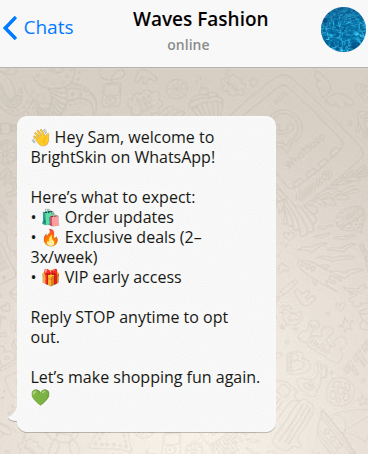
4. Segment Audience and Personalize Messages
WhatsApp blast messaging can be easy, but will not usually give the results you want. However, personalizeing following customer segmentation can easily grab any customers’ attention.
For example, you can segment your audience on WhatsApp based on:
- Purchase history
- Geographic location
- Engagement level
- Product interests
WhatsApp personalization is beyond using first names. Therefore, you should refer to the specific products they’ve viewed or purchased in your messages.
When you implement targeted WhatsApp marketing, conversion rates will improve by 10-15%. Hence, start with 2-3 segments and expand as you gather more customer data.
Related Reading: Learn how to segment the audience based on behaviour from our blog What is Behavioral Segmentation?
5. Set up WhatsApp Marketing Automation
WhatsApp automation has the ability to save your marketing team’s time by effortlessly keeping customers engaged.
However, be sure to set up these essential WhatsApp workflows:
- Welcome message for new subscribers
- Abandoned cart reminders (can recover up to 20% of lost sales)
- Order confirmation and shipping updates
- Post-purchase follow-ups and review requests
- Re-engagement for inactive customers
All automated WhatsApp flows must use pre-approved WhatsApp templates. Therefore, submit your templates early. Usually, it can take 1-3 business days for approval.
6. Track Performance & Optimize
You must continuously track your WhatsApp campaign analytics to refine your strategy and aim to improve results over time.
For example, some important KPI to monitor include:
- Delivery rate
- Open rate
- Click-through rate
- Conversion rate
To optimize WhatsApp marketing, A/B test different message formats, timing, and offers with small audience segments.
Furthermore, calculate your WhatsApp ROI by comparing campaign costs against direct revenue generated. This can help optimize your WhatsApp campain in future.
Generate WhatsApp opt-ins using Retainful’s smart popups and grow your subscribers list by 2X.
What are the Types of WhatsApp Campaigns?
The types of WhatsApp Campaigns are:
- Broadcast Messages
- Automated Flows
- Click-to-WhatsApp Ads
- WhatsApp Status Marketing
1.Broadcast Messages
WhatsApp broadcast messages let you reach your entire audience at once. You can, specifically, blast one message directly to the private window of everyone in the broadcast.
However, you can only send such WhatsApp promotion messages to customers who’ve opted in.
These types of WhatsApp marketing messages work well for:
- New product launches
- Flash sales (24-hour deals show urgency)
- Back-in-stock notifications
- Important company updates
2. Automated Flows
A WhatsApp drip campaign can nurture leads without manual work.
Moreover, unlike one-off broadcasts, you can automate the delivery of multiple scheduled messages based on customer actions.
Automated WhatsApp messages for e-commerce businesses convert best if they are personalized. Hence, you can send curated WhatsApp product recommendations based on browsing or purchase history for better results.
Effective WhatsApp automation for eCommerce flows includes:
- Welcome series for new subscribers
- Product education sequences
- Abandoned cart reminders
- Post-purchase follow-ups
Related Reading: Learn marketing automation of workflow from our blog: 10 Marketing Automation Workflow Examples.
3. Click-to-WhatsApp Ads
You can combine the WhatsApp ad campaign strategies with Facebook ads and add the “Message Us” button. This will, subsequently, open a WhatsApp conversation when clicked.
This is one of the best WhatsApp marketing strategies for creating WhatsApp retargeting ads.
Hence, for the best results with WhatsApp click-to-chat links:
- Target warm audiences (website visitors, engaged customers)
- Create dedicated landing pages for WhatsApp leads
- Prepare automated greeting messages
4. WhatsApp Status Marketing
WhatsApp’s status feature is often overlooked by businesses. Nevertheless, it is perfect for marketing using WhatsApp in a less intrusive way.
WhatsApp web marketing through status updates works well for:
- Behind-the-scenes content
- Quick flash sales
- New product teasers
- Customer testimonial highlights
Tip: For WhatsApp for customer engagement in retail, post status updates during peak shopping hours.
What are the Best WhatsApp Automation Flows?
The best WhatsApp Automation Flows are:
- Abandoned Cart Recovery Flow
- Order Confirmation & Delivery Notification Sequence
- Loyalty & Re-Engagement Loop
- Customer Support or Upsell Flow
1. Abandoned Cart Recovery Flow
If a customer abandons their cart without purchase completion, you can send WhatsApp cart recovery messages. They have 5x higher conversion rates than emails.
Here’s a proven 3-message sequence to recover abandoned carts using WhatsApp marketing:
- 1 hour after abandonment
- 24 hours later
- 72 hours later
An effective WhatsApp messaging software will let you automate the entire sequence.
Additionally, you can include product images and direct checkout links to reduce friction. WhatsApp sales notifications work best when they create urgency.
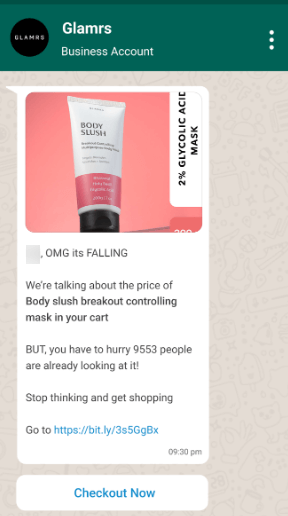
2. Order Confirmation & Delivery Notification Sequence
If a customer has completed the order, then you can send WhatsApp order tracking updates. Thus, WhatsApp order confirmation messages for online shops can reduce many queries that overwhelm WhatsApp customer support teams.
A typical post-purchase WhatsApp sequence includes:
- Order confirmation with receipt
- Processing notification
- Shipping alert with tracking link
- Delivery confirmation
- Post-delivery satisfaction check
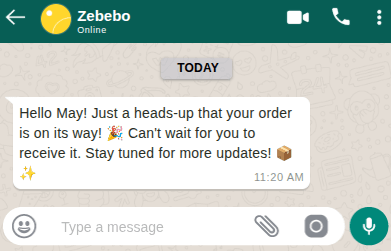
To optimize your WhatsApp message campaign flows, you can include next-step instructions at each stage.
3. Loyalty & Re-Engagement Loop
To create lasting customer relationships, you can create WhatsApp promotional campaigns that offer special perks and early access.
For customers who haven’t purchased in a while, try this WhatsApp re-engagement sequence:
- 30 days: 15% off your next order
- 60 days: Exclusive access to a new collection
- 90 days: Final chance: 20% off everything
Furthermore, WhatsApp promotion messages work best when it is personalized based on past purchases.
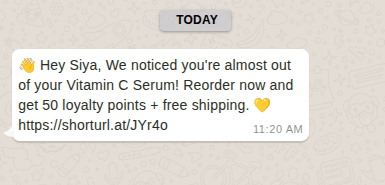
Tip: You can implement WhatsApp loyalty programs for shoppers and create a VIP feeling through exclusive offers and early access.
Related Reading: Learn how to set a loyalty program for your store from our blog: Best Ways to Use Loyalty Program to Boost Your Growth.
4. Customer Support or Upsell Flow
Before or after a purchase, you can use WhatsApp marketing to stay connected to customers.
Firstly, you can set up automated WhatsApp messaging for customer support. After that, your staff can pick up the chat when a human touch is needed. Hence, you can offer a prompt response at start and solve complex queries at later stage.
The best WhatsApp campaign idea is to leverage existing conversations rather than starting new ones. Therefore, you can collect WhatsApp customer feedback after support interactions to improve your service.
Using WhatsApp for customer engagement in retail can help offer relevant recommendations based on their requirement in chat.
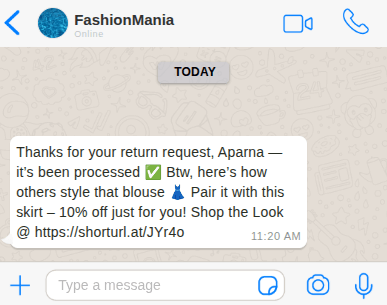
WhatsApp Marketing Strategies by Funnel Stage
Here are the strategies to apply WhatsApp Marketing by sales funnel stage:
- Acquisition: Click-to-WhatsApp, QR Codes & Lead Magnets
- Nurture: Personalized Drip Campaigns & Product Education
- Conversion: Offers, Urgency Messages & Limited-Time Discounts
- Retention: Customer Success, Reviews & VIP Community Access
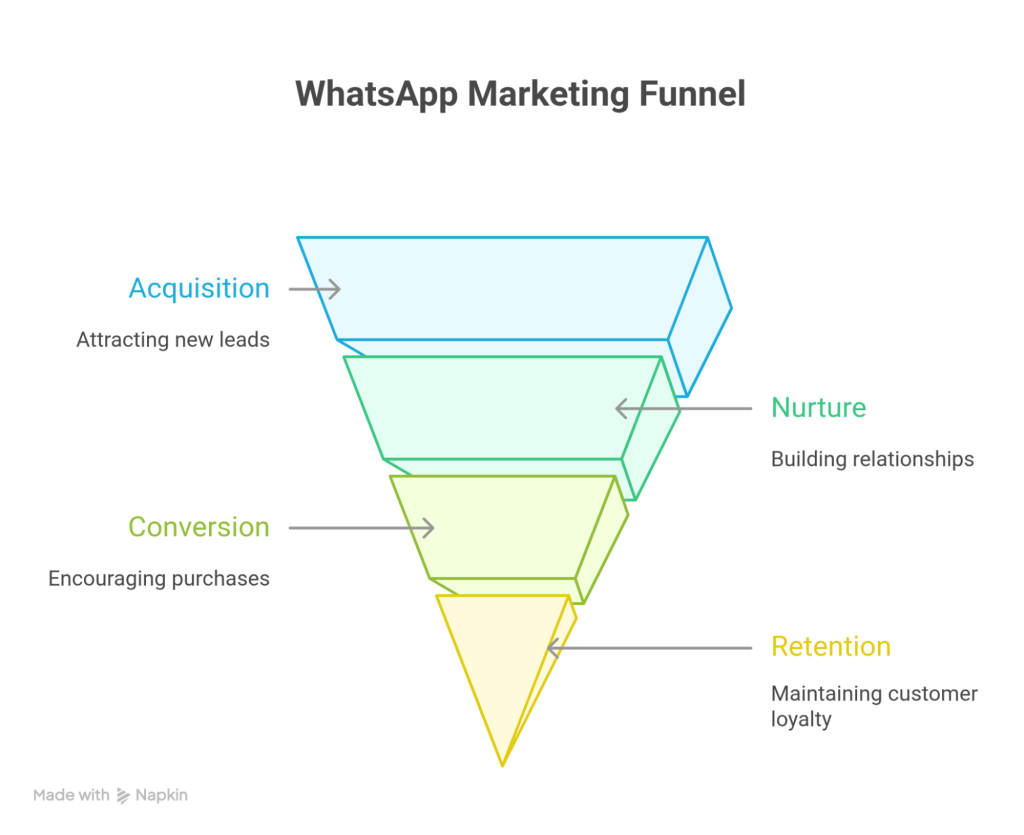
1. Acquisition
Marketing via WhatsApp starts with getting new contacts into your database.
For example, some effective WhatsApp opt-in methods include:
- QR codes on product packaging
- Website chat widgets
- Lead magnets (guides, quizzes, discounts)
- Instagram swipe-up links
Additionally, WhatsApp paid marketing using Facebook or Instagram can also help grow your subscriber list.
Tip: Offer immediate value to customers once they opt in to your WhatsApp promotional campaigns. Learn more about acquisition strategies.
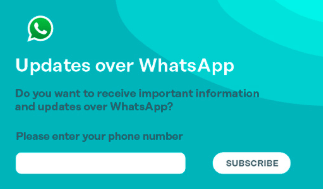
2. Nurture
WhatsApp drip campaigns can help leads through various informative content, as well as help build trust.
Digital marketing on WhatsApp works best when focused on education rather than selling.
Therefore, send personalized WhatsApp messaging that adds value to your customer. As a result, they will automatically be open to engage with you.
In addition, to re-engage customers, send personalized product recommendations via WhatsApp. This can increase the chances of interaction by nurturing leads.
3. Conversion
For higher conversions, combine personalization with urgency with marketing using WhatsApp.
As part of your promotional campaign on WhatsApp, include:
- Limited-time discounts with countdown timers
- Low stock alerts for watched items
- Bundle offers based on the cart
- Social proof
WhatsApp advertising campaign messages need clear calls-to-action and direct checkout links.
Moreover, sending promotional offers to customers on WhatsApp works best when they feel exclusive to that channel.
4. Retention
WhatsApp for marketing isn’t just about acquiring new customers. It’s also about keeping existing ones.
Thus, your retention strategies with WhatsApp can include:
- Product usage tips after purchase
- Warranty registration reminders
- Exclusive loyalty programs on WhatsApp for repeat buyers
- Early access to new collections
You can gather customer feedback through WhatsApp. In addition, you can also conduct WhatsApp surveys and share the results and further steps with customers.
As a result, you can make your customers feel valued and encourage to buy more from you.
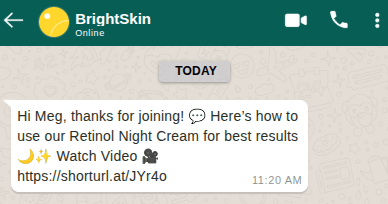
What are WhatsApp Marketing Rules & Best Practices?
The WhatsApp marketing rules and best practices are:
- Meta’s Messaging Policy & Template Approval
- GDPR & WhatsApp Marketing Compliance
- Optimal Opt-ins and Opt-outs for Consent
- Message Frequency & Segmentation to Avoid Ban
1. Meta’s Messaging Policy & Template Approval
WhatsApp campaign management must follow Meta’s strict messaging policies.
Message templates fall into two categories:
- Utility messages (order updates, receipts)
- Marketing messages (promotions, new products)
For successful WhatsApp advertising, all marketing templates must comply with the pre-approved guidelines by Meta.
Hence, understanding how to use WhatsApp for marketing within guidelines is important for long-term success.
2. GDPR & WhatsApp Marketing Compliance
WhatsApp SMS marketing must follow the same privacy regulations as other channels.
For example, EU audiences must ensure the GDPR practices, like explicit consent before messaging and clear opt-out instructions in every message.
Moreover, to ensure WhatsApp marketing best practice, create a detailed privacy policy explaining data usage and share to your customers.
In addition, your WhatsApp customer support system should also include processes for handling data deletion requests.
3. Optimal Opt-ins and Opt-outs for Consent
By using an efficient WhatsApp campaign software, you can make opt-in and opt-out seamless.
You can collect WhatsApp campaign opt-ins at the following places:
- Checkbox at checkout (not pre-checked)
- Post-purchase opt-in page
- Contest or discount sign-ups
In addition, for better opt-outs from the WhatsApp message campaign, you can simply add a message at the end, as shown in the screenshot.
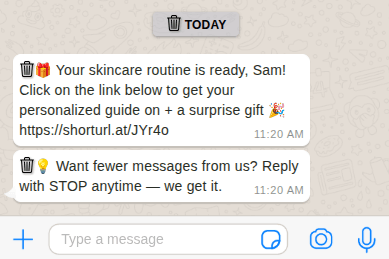
4. Message Frequency & Segmentation to Avoid Ban
For successful digital marketing with WhatsApp, you must learn to balance between frequency and relevance.
For example,
- Limit promotional messages to 2-4 per month
- Segment the audience by purchase history and engagement
- Honor quiet hours (no messages before 9 am or after 8 pm)
- Watch your block rate (should stay under 2%)
Following such best practices can ensure you are not banned by the app.
You can use WhatsApp marketing tools that include analytics to track opt-outs and engagement. Thus, you can focus on quality over quantity.
How to Avoid Common WhatsApp Marketing Mistakes?
1. Over-Messaging & Message Template Rejection:
Sending daily promotions or too many order updates leads to annoyance and failure of marketing through WhatsApp.
Moreover, repeating the same offer for all WhatsApp advertising messages can reduce customer engagement.
Furthermore, WhatsApp message templates get rejected for excessive caps, prohibited content, or bad formatting.
2. Neglecting Personalization & Timing
Generic greetings or ignoring names reduces the impact of content marketing on WhatsApp.
Use AI for personalized product recommendations via WhatsApp and send more relevant and timely content.
3. Ignoring Analytics or Not Iterating Campaigns
The best WhatsApp marketing strategies are data-driven. Hence, for successful WhatsApp campaign management, you should track open, click, and opt-out rates.
Based on the message performance across campaigns, you can improve weak points.
Reach customers through WhatsApp with Retainful and increase purchases per user by 40%.
Conclusion
WhatsApp marketing has already become a must-have for every brand to stay connected with its customers.
However, brands that see results don’t simply treat WhatsApp automation as a broadcast medium but as a platform to foster customer engagement and improve conversations.
Therefore, armed with knowledge from this blog, you can easily start your WhatsApp campaign that differentiates your from the rest and start seeing results.
Further Reading
- How to Attract More Customers to Your E-commerce Store
- 5 Easy Ways to Build Buyer Personas for Better Marketing Results
- Customer Lifecycle Marketing – Strategies for Each Stage + Examples
- How to Do Demographic Segmentation + Examples
Frequently Asked Questions
The WhatsApp Business app is free for small-scale messaging. However, for bulk messaging in WhatsApp and advanced features, you will need WhatsApp Business API, which is paid per message.
WhatsApp marketing is free for small-scale businesses if you use a WhatsApp business account. Consequently, you will get features like quick replies to manage customer interactions efficiently.
While the WhatsApp Business app has limitations, you can send bulk messaging for free using the WhatsApp broadcast feature. Additionally, you can also use WhatsApp status marketing to reach more people.
WhatsApp automatically reviews accounts for eligibility for higher tiers. Hence, to qualify, maintain a high-quality rating and consistent messaging volume.
WhatsApp has a file size limit of 2GB for direct transfers. Hence, if you have a larger file, you can compress it or use a Google Drive link.
The maximum length for a single WhatsApp message is 4096 characters. However, the best practice for WhatsApp promotional messaging is to keep the content simple and precise.
You can apply through Meta’s Business Manager and complete the verification process to get the WhatsApp business account API. Alternatively, you can also work with a WhatsApp Business Solution Provider for assistance.
WhatsApp group marketing is a strategy where businesses create WhatsApp groups, add their customers and share updates, and promote products. Subsequently, you can create a loyal community and enable direct communication.
A WhatsApp Business account is a way for businesses to reach out to their customers through automated messages or timely communication. Thus, you can enhance customer service and engagement.
